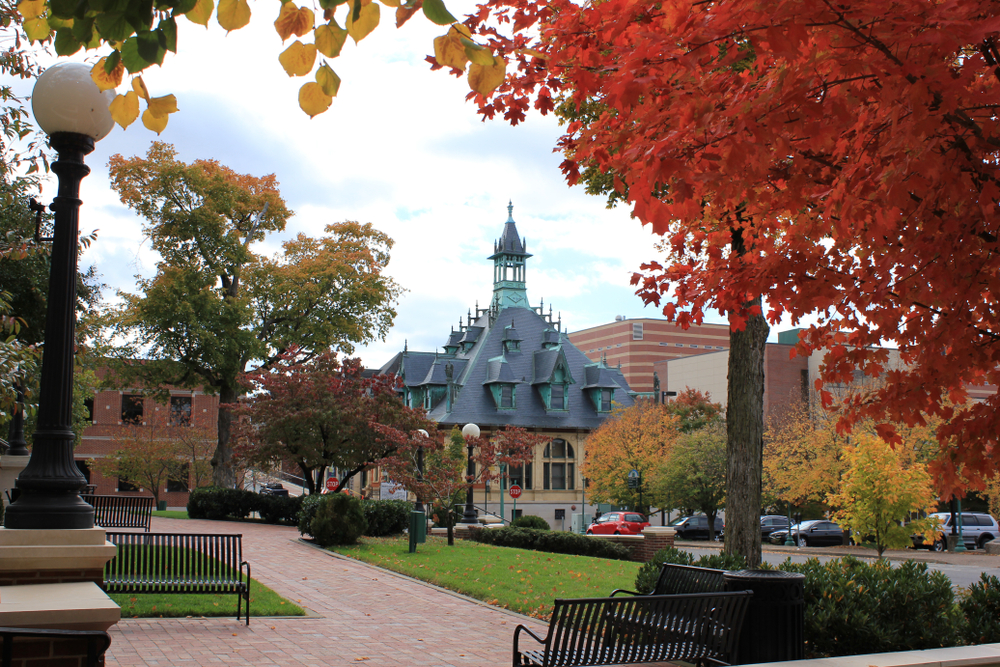Skilled Nursing in Clarksville, Tennessee: Search Near You, How to Pay, Licensing, Local Resources, and Questions to Ask
Located about 40 minutes northwest of Nashville along I-24, Clarksville is ideally situated for your next road trip. Clarksville is a lovely city that is most known as the location of Austin Peay State University. The city has been recognized as one of the best places to live in Tennessee by Money Magazine. Living in Clarksville offers residents a sparse suburban feel and most residents own their homes. It is a growing city however with a large Army installation. There are plenty of shopping opportunities, houses of worship, entertainment, medical providers and housing for everyone. The Customs House Museum offers local history, art exhibits, and model trains. To the northeast, surrounded by parkland, the vast Dunbar Cave complex dates back thousands of years and has many sinkholes. The McGregor Park Riverwalk follows the meandering Cumberland River.
Skilled Nursing Facility Communities near Clarksville, Tennessee
Spring Meadows Health And Rehabilitation
Clarksville, TN 37043
Elkton Nursing And Rehabilitation Center
Elkton, KY 42220
Christian Heights Nursing And Rehabilitation Cente
Pembroke, KY 42266
Hillcrest Healthcare Center
Ashland City, TN 37015
Signature Healthcare Of Clarksville
Clarksville, TN 37043
Ahava Healthcare Of Clarksville
Clarksville, TN 37043
American Health Communities Of Clarksville
Clarksville, TN 37040
Brigadier General Wendell H Gilbert Tn State Veter
Clarksville, TN 37042
Christian Health Center
Hopkinsville, Kentucky 42240
Western State Nursing Facility
Hopkinsville, Kentucky 42240

About Skilled Nursing in Clarksville
Seniors love living in Tennessee. The population of Tennessee is nearly 7 million, and about 17% of those people are aging adults 65 and older. These aging adults may require care at some point. You may hear the name “Nursing home” used to describe all types and levels of senior care. However, there are a variety of options aside from nursing homes. A Skilled Nursing facility is a state-licensed facility that provides a safe, therapeutic environment for individuals who require rehabilitative care. Skilled nursing in Tennessee typically helps with the transition between a hospital and more permanent residence, which could be an assisted living or independent living community. Most often, skilled nursing is short-term acute care, but there may be long-term care services as well. The Tennessee Board of Licensing Healthcare Facilities (part of the Department of Health) licenses and oversees all facilities in the state of Tennessee.
A skilled nursing facility is the building
Skilled nursing facilities offer 24-hour care and medical services, which include intermediate care and rebab and therapeutic care, all provided by licensed nurses and support professionals. Usually, skilled nursing is short-term acute care but may also offer long term care and intermediate care.
SNF, “skilled nursing facility” is the umbrella under which different care levels operate. “Nursing Home” is a common term used when referring to any/all senior living, although the term is a bit outdated.

Skilled nursing: Care that requires the skill of a nurse
Skilled Nursing is for seniors who may have planned surgeries or procedures (knee or hip replacement, etc.) and those individuals with acute or unplanned medical issues (Sepsis, cellulitis, UTI, etc). The oversight of a nurse may be required because care is not predictable and able to be preformed on a set schedule.
Levels of care offered in a skilled nursing facility
It is important to understand the differences between care services.
Rehabilitation and Therapy
- This is treatment for an injury, illness, or pains with the goal restoring function, including nursing and therapy services.
- The rehab plan is ordered by a physician. The services are provided by nurses and physical, occupational, and speech therapists.
Intermediate Care Facility (ICF)
- These are nursing facilities most suited for individuals who need 24-hour medical oversight in a well-structured setting.
- Often times, residents share a room and they are encouraged to bring personal items to create a more home-like environment.
Long-term Care
- Care provided by different caregivers in different settings.
- Assists with activities of daily living (ADLs).
- Care is not scheduled or predictable.
Examples of care provided at a Skilled Nursing Facility include:
- Skilled Nursing offers 24-hour skilled nursing care and medical services administered by licensed nurses and support professionals.
- This is the highest level of care provided that is not a hospitalization.
- A physician oversees the care of the individual.
- Trained staff assist with activities of daily living like bathing, dressing, feeding, using the bathroom and getting in and out of bed.
- Physical, occupational, speech, and respiratory therapy.
- Regular monitoring of heart rate, blood pressure, or blood sugar.
- IV therapy
- Wound and post-surgery care.
- Injected medications.
Considerations when looking for care in Clarksville
The hottest month of the year in Clarksville is July, with an average high of 89°F and low of 70°F. The cold season lasts for 3 months, from November 29 to February 27, with an average daily high temperature below 55°F.
With 170,957 people who call Clarksville home, you are bound to find the right home for you or your loved one. careavailability.com results show that there are 13 skilled nursing facilities within 25 miles of Clarksville.
Cities Near Clarksville
- Hopkinsville (KY) – 28 miles north of Clarksville
- Cumberland City – 20 miles south of Clarksville
- Woodlawn – 9 miles west of Clarksville
- Adams – 16 miles east of Clarksville
Pricing and How to Pay for Skilled Nursing
The average cost for a semi-private room in Tennessee will average around $7,125 / month. A private room in a skilled nursing facility is around $7,750 / month. Costs will vary due to many types of services and care. The daily costs of some of that care is averaged below:
- The national average cost (according to Genworth) for skilled nursing care per day is $325. This may not include all supplies, medications, therapy or rehab.
- Private rooms are more expensive at $340 per day.
- A shared room averages out to $310 per day.

Paying for Senior Living and Care will vary depending on a few factors. For instance, the level of care needed; the income and savings of the resident; the state and location of the community; or if the resident is a veteran. In the United States there are over 400 programs that may offer some monetary relief for senior care, but often the majority of costs are covered by private funds and family assistance. These funds come from our Federal, State, and Local Governments.
It is important to take your time when exploring payment and coverage options.
Private pay – YES:
- Many families pay for assisted living with private funds.
- Private pay can be a combination of retirement funds, personal savings, and pension payments.
- Family members may contribute funds to pay for assisted living or other senior housing and care.
Medicare -MAYBE:
Medicare will TYPICALLY cover Skilled Nursing (SNF) care ONLY under these factors:
- People 65 years and older and individuals with end stage renal disease are eligible for Medicare benefits, no matter their income.
- Coverage is meant for people in need of short-term care.
- The person has Medicare Part A, and has available days left in their benefit period. The person has a qualified hospital stay. (3 consecutive midnights or more)
- The individual must enter SNF within 30 days of leaving the hospital.
- The person’s doctor has ordered inpatient services at a skilled nursing facility.
- The individual must need and receive the skilled care daily. The care provided must be care that the person can only receive in a SNF.
- The person needs skilled services because of an ongoing condition or a new condition that started while in a SNF for treatment of an ongoing condition.
- The skilled services must be reasonable and necessary for the treatment of the condition.
- You must receive the care in a Medicare certified SNF.
Medicaid – MAYBE:
Medicaid can be a payer source if the patient needs both care and has a financial hardship based on the individual state criteria. Eligible participants include: low-income adults, elderly adults and people with disabilities. The program is funded jointly by each state and the federal government; and national guidelines are in place do decipher how states must spend Medicaid money, but with allowances toward the guidelines. Every state has their own individual Medicaid assistance program. Each state determines what levels of care will be covered by Medicaid, who is eligible, and how much the state will reimburse the care community.
- Skilled nursing falls under Medicaid’s Nursing Facility Services.
- People who are eligible for Medicaid must meet the state criteria for skilled nursing care.
- The state of residency must abide by federal law and regulations when setting their skilled nursing care requirements.
- The patient meets the state guidelines for income and asset limits.
If you are unsure whether you qualify for Medicaid, you should apply. You may be eligible depending on your household income, family size, age, disability and other factors.For a clearer understanding on coverage contact your State Health Insurance Assistance Program.
Long-term Care Insurance – MAYBE:
Long term care insurance is a great way to pay for assisted living, and planning ahead is important when considering how to pay for senior housing and care. Nearly 75% of people over the age of 65 will require long-term care services at some point, so naturally, buying into long-term care insurance when a person is in their 50s and 60s is the most common time to do so.
- Long-term care insurance helps cover the costs of chronic medical conditions.
- Individuals and couples with the ability to pay into long-term care insurance have the advantage of a head start in allocating funds for senior care.
Veteran Aid and Assistance – MAYBE:
This benefit is available to some military veterans and surviving spouses who live in an assisted living community and those who have in-home care.
- There are specific guidelines, but a veteran may qualify for as much as $2,050 each month.
- A veteran with a sick spouse may be eligible for $1,600 per month.
- If a veteran has passed, their surviving spouse can qualify for $1,300 per month.

Questions to ask a skilled nursing facility
- Is the facility licensed?
- Has the facility’s license ever been revoked?
- Is the facility Medicare/Medicaid certified?
- What types of insurance is accepted?
- Are all specific medical needs able to be met?
- What services are offered?
- What is the rate for basic care?
- Are any reviews available to be seen by the public?
- Are protocols in place to ensure healthy, balanced meals?
- What if an individual has specific dietary restrictions, can they be met at the facility?
Additional questions and inquiries to ask skilled nursing facilities
- What should a new resident (patient) bring with them?
- What is the difference between skilled nursing and assisted living?
- What happens in case of an emergency?
- Can the family pet visit the resident?
- What is the level of privacy?
- What are the available social activities?
- What is the hours for family visits?
- Can patients request special meals for dietary needs?
- Are skilled nursing facilities connected to hospitals?
- How big are the rooms?
- What are the training requirements of skilled nurses?
Local Hospitals and Care Providers
Tennova Healthcare – Clarksville
651 Dunlop Ln, Clarksville, TN 37040
Clarksville Regional
311 Landrum Pl, Clarksville, TN 37043
Resources and Links – Tennessee
Greater Nashville Regional Council, Area Agency on Aging and Disability The GNRC serves as a single point of entry for older adults and adults with disabilities in need of home and community based supports and services.
Aging Commission of the Mid-South Area Agency on Aging and Disability SERVICES INCLUDE- Adult Daycare, Home Delivered Meals, Medical Equipment, Personal Emergency Response System (PERS), Medicaid Waiver Program, Personal Care, In- Home services, and Information & Referral (Home Modifications/Repairs, Legal Aid, State Health Insurance, Transportation).
Southeast Tennessee Area Agency on Aging and Disability Programs include: Congregate and Delivered Meals, Homemaker Services, Options for Community Living, Caregiver Support Program, Supplemental Nutrition Assistance Program application assistance. Whether you’re a senior, an adult with a disability or a caregiver, your first call should be to your Area Agency on Aging and Disability. The statewide, toll free number connects you to the local Aging and Disability Resource Center.
East Tennessee Area Agency on Aging and Disability Regional not-for-profit agency providing information, advocacy, access and home support services to elders and persons with disabilities in the middle East Tennessee region. As a regional office, we administer funds to provide group and home-delivered meals, homemaker services, personal care services, legal services, ombudsman services, limited transportation services, information and assistance services, case management, Medicare insurance counseling services, health promotion services, senior centers, county offices on aging, and public guardianship services. These services are provided directly and through a number of service provider contracts in the region
Knoxville-Knox County Community Action Committee The CAC Office on Aging is a public nonprofit agency. It has the major responsibility in Knoxville and Knox County of planning for services for senior citizens; assessing needs of older citizens and developing resources to meet those needs; coordinating services for the elderly to minimize duplication and avoid overlap–whether provided by public, nonprofit, or for-profit organizations; providing information about services and programs to older citizens and their families and connecting them to those services; and advocating on behalf of older citizens.
Tennessee Commission on Aging and Disability The Commission is the designated state unit on aging mandated to provide services of the Older Americans Act and other discretionary grants.
Department of Human Services Adult Protective Services Division Adult Protective Services may assist an adult in any living arrangement including nursing homes, group homes, their own homes, homes of relatives or friends, etc.
Eldercare Locator This is a great resource to search for specific care in specific counties and cities. This database is a nationwide resource that connects older Americans and their caregivers with trustworthy local support resources. Connect with services such as meals, home care or transportation, or a caregiver education or respite from caregiving responsibilities. The Eldercare Locator is a public service of the Administration on Aging (AoA), an agency of the U.S. Administration for Community Living.
Medicare provides a search feature to find & compare providers near you, most senior housing and care providers are included on CareAvailability.com. Find & compare plans in your area. Determine if you qualify for premium savings
Medicaid offers information on how to apply for Medicaid, eligibility criteria, links to local state offices, and additional resources
The Alzheimer’s Association is the leading voluntary health organization in Alzheimer’s care, support, and research. Whether you are living with Alzheimer’s or caring for someone with the disease, information and resources are available.
Search other areas for skilled nursing
Not finding what you’re looking for? Take a look below.
